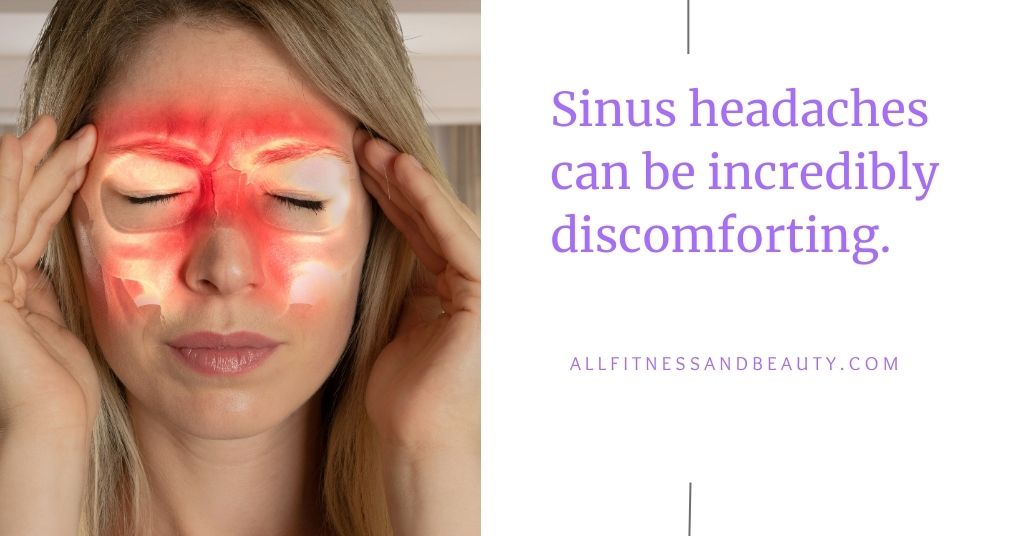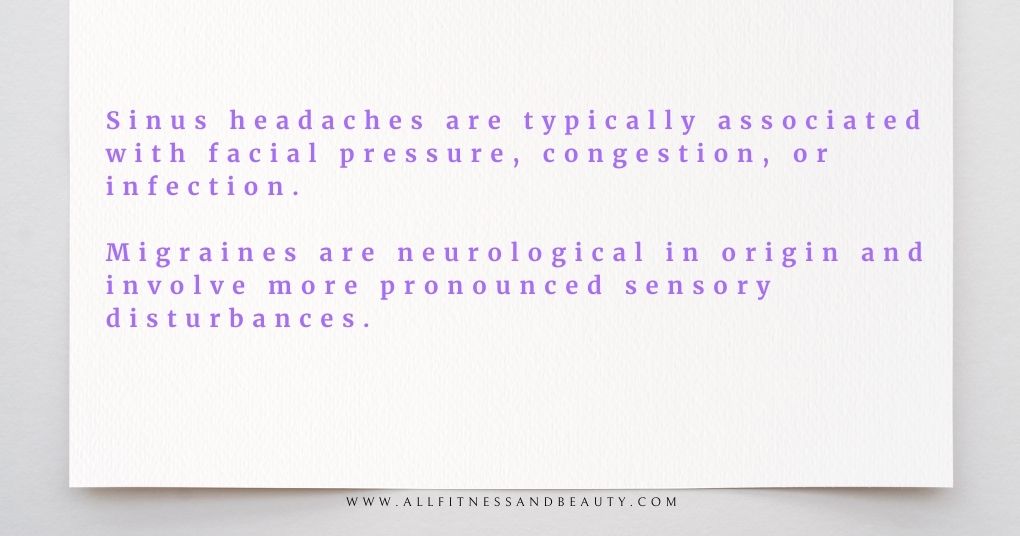Will Migraine Medicine Help with Sinus Headaches?
Sinus headaches can be incredibly discomforting. If you have sinus headaches, the pain can feel like you have sinusitis or sinus infection. There’s pressure around the eyes, cheeks, and forehead. But this pain might actually caused by a migraine. Will migraine medicine help with sinus headaches?

Let’s dive in.
What are Sinus Headaches? Will Migraine Medicine Help with Sinus Headaches?
As the name suggests, sinus headaches are headaches that stem from issues within the sinuses. The sinuses are air-filled cavities located behind your forehead, cheekbones, and nasal passages.
Normally, these cavities are lined with a thin layer of mucus that helps trap harmful particles like dust and bacteria.
When the sinuses become inflamed or infected, it can lead to a sinus headache.
Migraine medication may provide some relief for this type of headache. Unfortunately, it is not the first line of treatment.
Here are the reasons.
Different Underlying Causes
Migraines and headaches have different underlying causes. Sinus headaches are primarily caused by inflammation or infection in the sinus cavities.
Migraines, however, are a neurological condition. Later on, I’ll talk about the common causes of sinus headaches.
Migraine medication is designed to target the mechanisms of migraine headaches. Thus, this type of medication may not effectively address the root causes of sinus headaches.
Specificity of Medication
Migraine medications are often tailored to target the specific pathways involved in migraine attacks, such as serotonin receptors. These medications may not address the inflammation, congestion, or infection in the sinuses that contribute to sinus headaches.
Possible Overuse
Using migraine medicines for sinus headaches without a migraine diagnosis can lead to overuse and potential side effects. Some migraine medications, especially those containing triptans, should be used sparingly to avoid rebound headaches or other adverse effects.
OTC Medications
Some medications may help your sinus headaches.
Decongestants, for instance, may work. This kind of medicine narrows blood vessels to reduce inflammation and swelling.
The pain may also be relieved by taking pain relievers, like acetaminophen or ibuprofen. But I would not recommend ibuprofen, especially if you have gastric issues, like GERD.
It is also not good if you take it on an empty stomach.
Try this Alternative Treatment
Migraine Hat
This alternative treatment can offer several benefits if you suffer from sinus headaches or migraine. This hat is a specially designed headwear item created to provide comfort and relief during headache episodes.
Here are some of its benefits:
Cold therapy: The migraine cap is equipped with pockets for cold packs or gel inserts. Cold therapy is a widely recognized method for reducing headache symptoms. Applying cold to the head can help constrict blood vessels, reduce inflammation, and numb the area, which can alleviate pain and discomfort.
Heat therapy: A migraine hat or cap offers the option of using heat packs or inserts. Heat therapy can be beneficial for tension headaches or headaches caused by muscle tension. It helps relax tense muscles and improves blood flow, which can ease headache symptoms.
Hands-free relief: The migraine cap is designed to be worn on the head, allowing you to move around and engage in various activities while receiving headache relief.
Read: Will a help a migraine?
What are the Common Causes of Sinus Headaches?
- Sinus infection: One of the primary culprits behind this type of headache is sinusitis. It is an inflammation or infection of the sinuses. When the sinuses become congested due to infection, mucus can’t drain properly, resulting in pressure and pain.
- Allergies: Allergic reactions to pollen, dust, pet dander, or other allergens can trigger sinus headaches. When allergens irritate the nasal passages, it can lead to inflammation in the sinuses.
- Nasal Polyps. These noncancerous growths in the nasal passages can obstruct normal sinus drainage. As a result, they cause pressure and pain in the forehead and around the eyes.
- Deviated Septum. A deviated septum occurs when the thin wall between the nostrils is displaced. This condition can lead to sinus blockages, increasing the risk of sinus headaches.
- Environmental irritants: Exposure to irritants such as smoke, pollution, or strong odors can irritate the sinuses and trigger headaches.
- Changes in air pressure: Sudden changes in altitude, like during air travel or scuba diving, can affect sinus pressure and potentially cause headaches.
Read: Is migraine medicine safe during pregnancy?
Overlap in Symptoms
The overlap in symptoms between sinus headaches and migraines can lead to confusion in diagnosis. Here are the reasons these two types of headaches are often mistaken for each other:
Pain Location
Both sinus headaches and migraines can cause pain in the forehead and around the eyes. This shared pain location can make it difficult to distinguish between the two.
Facial Pressure
Both types of headaches can create a sensation of pressure or fullness in the face, particularly in the sinus and forehead areas. This feeling of pressure is a common symptom of both conditions.
Nasal Symptoms
Sinus headaches often coincide with nasal symptoms like congestion, runny nose, and postnasal drip. These symptoms can be similar to the sinus congestion that may accompany a migraine.
Sensory Sensitivity
Migraines often involve sensitivity to light and sound. However, some individuals with sinus headaches may also experience sensitivity to light or sound due to the discomfort they are feeling.
Nausea
This is a symptom that can occur in both headaches. It is more commonly associated with migraines. But it can also be present in sinus headaches, especially if the pain is severe.
Misdiagnosis
You may have sinus headaches. But you may self-diagnose your headaches as migraines, especially if you have had migraines in the past. This can lead to a misdiagnosis and inappropriate use of migraine-specific medications.
Similar Triggers
Certain triggers, such as changes in weather, environmental factors, like allergens or irritants, and stress can contribute to both sinus headaches and migraines.
This shared trigger potential can further blur the lines between the two conditions.
Read: Do cell salts treat migraines?
Distinguishing Factors
Sinus headaches are typically associated with facial pressure, congestion, or infection. Migraines are neurological in origin and involve more pronounced sensory disturbances.
Sinus headaches are often related to sinus issues, like infection and inflammation. Migraines, on the other hand, are a primarily neurological condition.
Migraines tend to have a more pulsating and severe pain quality compared to the constant pressure or ache of sinus headaches.
It is challenging to distinguish between these two types of headaches. The reason for this is that their symptoms can overlap.
Effectiveness of Migraine Medicine

The effectiveness of migraine medication can vary depending on several factors. These would include the type of medication, your specific migraine pattern, and how well the medication is suited to your needs.
You may take abortive medication. It is taken during a migraine attack to relieve symptoms. Common examples include tritons, NSAIDs, and ergotamines.
Preventive medicine is also taken to reduce the frequency and severity of migraine attacks. Options include beta-blockers, antiepileptic drugs, and certain antidepressants.
Rescue medications are usually taken if acute medications do not work. They can include medicines like dihydroergotamine (DHE) or corticosteroids.
Combination therapy is also advised. You may benefit from it if you have severe migraine.
Alternative Treatments for Sinus Headaches
When dealing with sinus headaches, alternative treatments can provide relief or complement conventional medical approaches.
Saline Nasal Irrigation
This can help clear mucus from the nasal passages. It reduces congestion and pressure. You can use it as a daily hygiene practice or during a sinus headache to alleviate symptoms.
Steam Inhalation
Inhaling steam from a bowl of hot water can moisten the nasal passages and promote drainage.
Adding a few drops of eucalyptus or peppermint essential oil to the hot water may provide additional relief.
Talk to Your Doctor
Will migraine medicine help with sinus headaches? The effectiveness of migraine medication is multifaceted and varies from person to person. It requires careful consideration of medication type, timing, dosage, and individual factors. Talk to your doctor about it. To try the alternative treatment called cold or warm therapy, please visit our online shop or just click this link.





Leave a comment